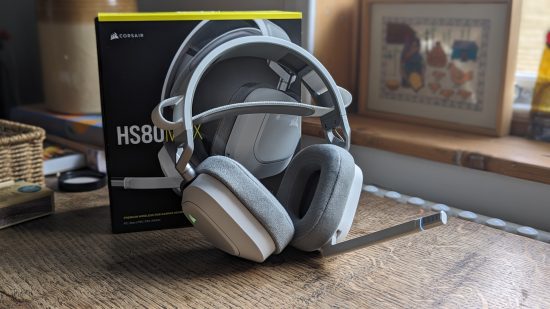Our Verdict
The Corsair HS80 Max Wireless delivers on all key fronts for a headset: it’s got a brilliant sound profile, excellent microphone, and looks great to boot.
Let’s start off with a bang: the Corsair HS80 Max Wireless is the best-sounding gaming headset I’ve ever used. Although it’s clearly aimed at a gamer audience, with a priority on in-game sounds like footsteps and gunshots, it’s now my go-to listening gear for music and podcasts, too.
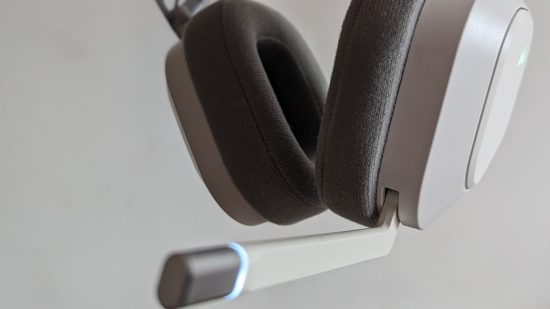
At $179.99, it’s on the costlier end of the headset spectrum, but I think Corsair’s done enough to warrant the price tag. As well as sounding great, the HS80 Max delivers on every other front, including its design, microphone, and the iCue software backing it up.
It’s made clear improvements over the decent Corsair HS80, including the addition of Bluetooth connectivity that instantly makes the HS80 Max a much more versatile piece of kit. Let’s start with how it looks.
Pros:
- Excellent sound quality
- iCue, accompanied by SoundId and Nvidia Broadcast, brings a new dimension to the headset
- Stylish design
Cons:
- Better price-to-performance ratio can be found in cheaper headsets
| Corsair HS80 Max specs | |
| Drivers | 50mm |
| Connectivity | 2.4GHz, Bluetooth |
| Frequency response |
20Hz – 40 kHz |
| Weight | 352g |
| Battery life | Bluetooth – up to 130 hours, 2.4Ghz – up top 65 hours |
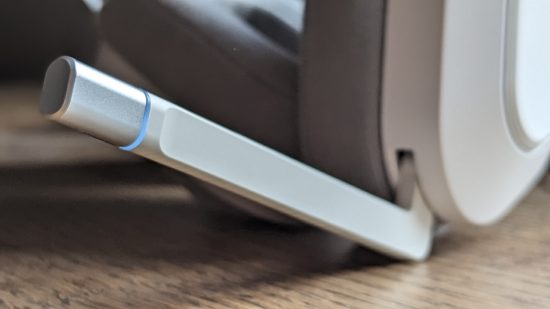
Corsair HS80 Max Wireless design
The HS80 Max I’m reviewing boasts a sleek, pure white design, although there’s also a black version available. I’m usually a sucker for black headsets, but there’s something I love about the contoured, space-age looks of the white version.
I especially appreciate it when gaming headsets obey the style norms that regular headphones are bound by. What makes gaming gear companies think that, just because I’m a gamer, I want to wear some blocky plastic monstrosity? With that in mind, the HS80 maintains that gaming headsets can be classy while still clearly gaming headsets.
There’s a limited amount of RGB on the outside of the ear cups – and even that is too much in my view (or not, as the case may be), since I can’t even see the lights when I’m wearing the headset! – but the rest of the design is stylish enough that I can rock it anywhere. It’s a permanent fixture while I’m gaming, of course, but you’ll also catch me sporting it round town, on walks, and at the gym. There’s not many gaming headsets that I’d do that with.
One downside is the mic, which protrudes awkwardly from the left ear cup. Luckily, you can fold it out of the way, in line with the headband, and this also functions as a way of switching off the mic, which is a nice touch.
Elsewhere on the set, the light gray, cloth ear pads and contoured edges soften what could otherwise have been an unfashionably angular design. The other benefit of these ear pads is that they’re super comfortable, much better than leatherette ones in my opinion. That sense of comfort thankfully pervades the HS80 Max across the board.
Although these cans weigh a substantial 352g, you wouldn’t know it from wearing them. The distribution of weight is first class, and I’ll happily wear them for hours across heavy gaming or writing sessions without any sign of headphone fatigue.
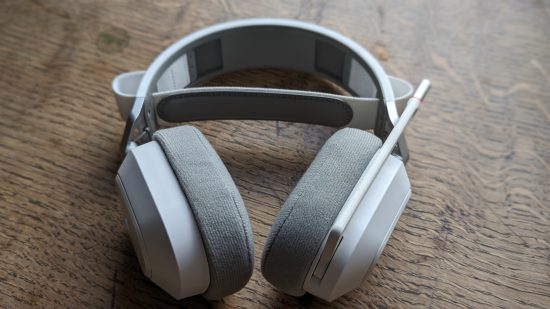
Corsair HS80 Max Wireless performance
The sound profile of the HS80 max is fantastic. The 50mm neodymium audio drivers deliver high-fidelity sounds across a 20Hz-20,000Hz frequency range, with booming bass, clear mids, and crisp treble. It excels with in-game audio, as expected, but can also compete with mid-range, music-oriented headphones surprisingly well. Whether it’s broadcasting teammates’ callouts, a clash of swords in Baldur’s Gate 3, or Bach’s Cello Suites, the HS80 brings you rich sounds, with depth that can be tweaked in iCue based on your listening preferences, something I’ll talk about later.
The main thing I love about the HS80 Max is just how full it sounds. The Dolby Atmos spatial audio it comes equipped with on PC really delivers. Of course, that’s handy for a sweaty ladder session on Valorant, but it also means that music comes through really nicely as well.
And these impressive sounds can be delivered through multiple means. The primary way of listening is through a 2.4Ghz wireless receiver that you can plug into your PC’s USB slot, which guarantees an impressive 24bit/96kHz sound. Corsair claims this has a 50ft range, and this might be true if you’re in an enormous, open-plan banquet hall, but it’s a little less through walls. Still, it traveled from my PC on the first floor of my house to my yard through two walls, which was sufficient for any use I could foresee.
As mentioned above, the HS80 Max also offers Bluetooth connection, meaning you can use it with your phone, tablet, or laptop. This is a clear step up from the previous iteration, which wasn’t Bluetooth-compatible. Sadly, the Bluetooth connection seems to have come at the expense of a standard wired connection, which is a shame for those of us looking to preserve battery life for whatever reason. I asked a representative of Corsair why the company had taken that decision for the HS80 Max, but they didn’t respond.
On the subject of battery life, the HS80 Max is also fantastic on that front. I’ve hardly heard the dreaded ‘battery low’ noise during my month with the headset. You may think I’m one of those people who diligently charge their wireless gadgets when they go to bed, but that couldn’t be further from the truth.
I’ve pinned down one reason for the HS80 Max’s superlative battery performance, aside from a presumably large capacity: you can set it to switch itself off after a number of minutes of your choosing. I went for 10 minutes, which was never obtrusive, but also likely saved a lot of charge. iCue also gives you the choice to turn off the HS80 Max’s RGB lighting, another decision which benefit the battery. And that brings us nicely to the next section.
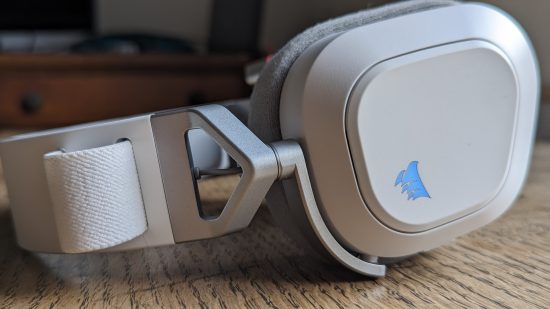
Corsair HS80 Max Wireless features
As mentioned, iCue is Corsair’s excellent peripheral software. It’s more in-depth than most headset companion programs, and that’s a good thing, especially as it comes with tutorials on how to use its more esoteric features. iCue lets you tinker with your kit to an impressively granular level, even allowing you to customize the small RGB panels on the side of the set with different lighting profiles, or choose from a series of commands to assign to pressing in the volume scroll wheel.
But the main attraction is iCue’s range of options to tweak the HS80’s sound profile. The equalizer is a typical affair, offering several presets aimed at gaming or listening to music, as well as the option to create your own presets by tweaking how loudly different frequencies – ranging from 32 to 16KHz – come through the cans. As I say, pretty standard stuff. The HS80 Max’s out-of-the-box profile is pretty balanced anyway, so my custom presets just boosted the bass and treble a tiny bit.
What’s more intriguing is the addition of SoundID. This complementary software from Sonarworks is embedded into the iCue app, providing an alternative to the traditional equalizer. It creates a SoundID profile by subjecting you to a series of sonic tasks, like adjusting the volume for your left ear cup until you can no longer hear the noise coming through that side of the set. Then, it plays music and asks you to choose from a variety of different presets on the basis of what you think sounds best.
Essentially, it’s working out how well you can pick up sound at a variety of frequencies and how you instinctively like your music to come across and makes you a sound profile on that basis. I was quite happy with my SoundId profile, but it was a shame that you couldn’t tweak it or customize it any further. I do tend to have SoundID enabled, rather than using the equalizer’s presets, though, which shows how much I rate it.
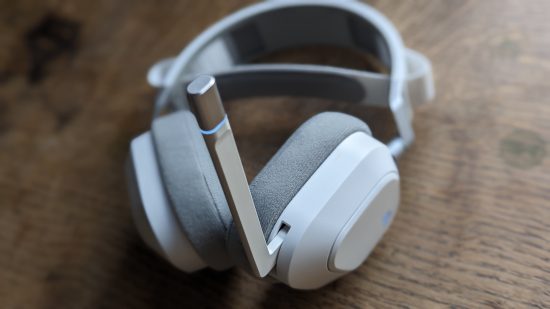
Last but not least, we come to the HS80 Max’s microphone. My first impression wasn’t amazing, as the mic juts straight out from the left ear cup, and isn’t remotely malleable. I was a little concerned this would translate into murkier comms, given the mic’s distance from my mouth, but this fear proved totally unfounded. The mic is really solid, bringing through the full range of my voice much better than most competitor products. The bass in my voice came through especially well in the recordings I did on Soundtrap to test the mic, and as someone with a deeper voice, this was pleasing to note. When playing with friends, the mic facilitated crystal clear comms without the need for software support.
But it’s when I got iCue involved that the mic really began to shine, and that’s thanks to the addition of Nvidia Broadcast. This optional add-on is a separate download, but one that I’d wholeheartedly recommend. Nvidia Broadcast uses AI (in some unknown fashion) to deliver cutting-edge noise and ‘room echo’ removal.
This tech really is a game changer. I tested the mic out with Nvidia Broadcast’s settings enabled and disabled… And wow! It made a huge difference. This software totally cuts out background noise, to the point of neutralizing the music coming from my phone on the desk in front of me while I am talking. It doesn’t just dampen those irritating sounds down a bit: it cuts them out entirely.
This, combined with iCue’s various options for tweaking the drivers’ sound profile, makes iCue a very easy recommendation if you’re going to fork out for the HS80 Max. In fact, if you’re not downloading iCue, you’re missing out on a lot.
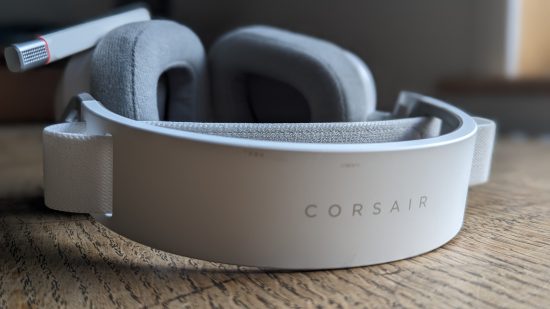
Is the Corsair HS80 Max worth it?
I firmly believe the HS80 Max is a contender for best gaming headset. It’s an absolute workhorse of a product, delivering great performance on all fronts with a battery that’ll last for days, all while staying comfortable and stylish on your head. That’s not to mention iCue, a piece of software which will take these cans’ performance into the stratosphere.
The only real downside is the cost. Its $179.99 price tag puts it at the high end of gaming headsets, but I genuinely think it’s worth it if you can spare the cash. Obviously, if you’re on a strict budget, you’ll probably get better performance per dollar elsewhere, but I don’t think anyone who splashes out on an HS80 Max will be disappointed.
